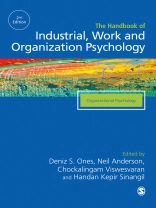The second volume in the SAGE Handbook of Industrial, Organizational and Work Psychology looks in detail at how teams and individuals function and perform. It covers motivation and organizational socialisation as well as the latest research into diversity and organizational culture in the workplace. There are also sections on social networks and how job loss and the experience of unemployment can affect individuals and wider groups within organizations. Part One: Lenses Part Two: Social and Political Order Part Three: Legacies Part Four: Problems and Problematics
Inhoudsopgave
PART 01: Work Attitudes and Values
1. Attitudes: Satisfaction, Commitment and Involvement – Marcus Credé
2. Employee Self Concept and Identity – Russell E. Johnson, Chu-Hsiang (Daisy) Chang, You Jin Kim and Szu-Han (Joanna) Lin
3. Organizational Justice – Stephen Gilliland
PART 02: Motivational Perspectives
4. The Building Blocks of Motivation: Goal Phase System – Piers Steel and Justin Weinhardt
5. Self-Determination Theory Applied to Work Motivation and Organizational Behavior – Marylène Gagné, Edward L. Deci & Richard M. Ryan
6. Action Regulation Theory: Foundations, Current Knowledge, and Future Directions – Hannes Zacher & Michael Frese
7. Goal Setting Theory: Controversies and Resolutions – Gary P. Latham & Edwin A. Locke
PART 03: Performance Management
8. Pay Levels and Pay Changes – Jason D. Shaw
9. Revisiting the Social Context of Performance Management: Performance Appraisal Effectiveness – Paul E. Levy, Caitlin M. Cavanaugh, Noelle B. Frantz, Lauren A. Borden & Ariel Roberts
PART 04: Talent Management and Development
10. Learning, Training, and Development in Organizations: Emerging Trends, Recent Advances, and Future Directions – Bradford Bell and Ozias Moore
11. Employee Development: The Process and Practice of Work-Related Learning – Sarah A. Hezlett & Cynthia D. Mc Cauley
PART 05: Leadership, Groups and Teams
12. Leadership in Organizations – Robert Hogan, Gordon Curphy, Robert B. Kaiser and Tomas Chamorro-Premuzic
13. Team Design Characteristics – Greg L. Stewart and Kameron M. Carter
14. From Teams in Organizations to Organizing in Teams – Leslie A. De Church, Dorothy R. Carter, Raquel Asencio, Amy Wax, Peter W. Seely, Kathryn Dalrymple, Sidni A. Vaughn, Benjamin R. Jones, Gabe Plummer & Jessica R. Mesmer Magnus
15. Multiteam Systems: The Next Chapter – John E. Mathieu, Margaret M. Luciano & Leslie A. De Church
PART 06: Work Design and Interventions
16. Work Design for Performance: Expanding the Criterion Domain – Daniela Andrei & Sharon Parker
17. Management Interventions – Robert (Bob) Cardy & T. T. Selvarajan
18. Employee Participation – Melissa Chamberlin, Jeffery A. Le Pine, Daniel W. Newton & Linn Van Dyne
PART 07: Psychology of Work Relationships
19. Trust at Work – Ana Cristina Costa, Donald L. Ferrin & C. Ashley Fulmer
20. Politics in Organizations – Gerald R. Ferris, John N. Harris, Zachary A. Russell, and Liam P. Maher
21. Toxic Emotions at Work – Michelle K. Duffy and Lingtao Yu
22. Exchange in the Employee-Organization Relationship – Lynn M. Shore, Jacqueline A-M. Coyle-Shapiro & Chiachi Chang
Over de auteur
Dr. Viswesvaran conducts research on personnel selection, performance appraisal, and personality assessments in the workplace. He employs meta-analytic methods and also investigates related methodological issues in research. Dr. Viswesvaran teaches personnel psychology, personnel selection, training, psychological assessment, as well as proseminars in industrial-organizational psychology. Dr. Viswesvaran serves on the editorial boards of Journal of Applied Psychology, Educational and Psychological Measurement, Journal of Organizational Behavior, Journal of Personnel Psychology, Journal of Business and Psychology and is the Editor of the International Journal of Selection and Assessment. Dr. Viswesvaran is a fellow of the Society for Industrial and Organizational Psychology (SIOP) as well as a Fellow of Division 5 (measurement) and Division 14 (Industrial- organizational psychology) of the American Psychological Association.












